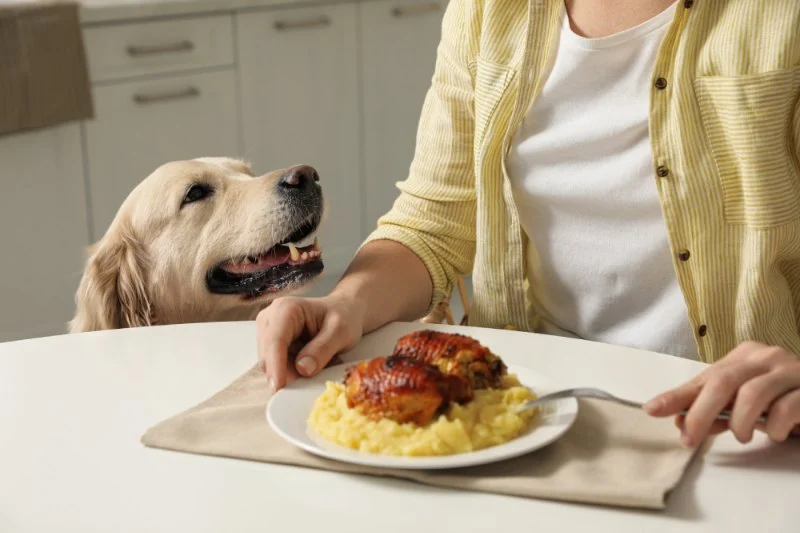
How to Stop Your Dog from Begging at the Dinner Table
- 1. Understanding Why Dogs Beg
- 2. Methods to Stop Begging
- 3. Training Tips for Long-Term Success
- 4. Common Mistakes to Avoid
1. Understanding Why Dogs Beg
Dogs are social creatures and are naturally inclined to seek attention, especially from their owners. Begging at the dinner table is a common behavior, and while it may seem cute at first, it can quickly become annoying. Understanding the reasons behind this behavior is key to solving the problem.
Begging often stems from the fact that dogs associate food with positive reinforcement, especially if they’ve been rewarded with scraps in the past. Over time, your dog learns that begging leads to food, reinforcing the behavior. Therefore, addressing this habit requires patience, consistency, and understanding of the underlying motivations.
2. Methods to Stop Begging
There are several effective strategies to stop your dog from begging during meals. Let’s explore the most successful methods:
2.1. Consistency is Key
The most important aspect of curbing begging is consistency. If you occasionally give in and feed your dog while you're eating, it sends mixed signals. Be consistent about not feeding them from the table, and they will eventually stop associating your mealtime with snacks.
2.2. Provide a Designated Eating Area
Creating a designated eating area for your dog can help manage their behavior during your meals. Place their bed or crate in a different room or in a corner of the dining area. Over time, they will associate their spot with relaxation, rather than expecting food from your table.
2.3. Reward Good Behavior
Rewarding your dog for staying calm during meals is crucial. Use positive reinforcement such as praise, toys, or treats when they remain in their designated area without begging. This helps them understand that good behavior earns rewards, while begging does not.
2.4. Avoid Eye Contact
Dogs can interpret eye contact as a form of attention. When your dog starts begging, avoid making eye contact with them. Instead, turn your body slightly away from them or ignore them until they stop begging. This removes the attention they seek from you and helps break the habit.
3. Training Tips for Long-Term Success
While the methods mentioned above can yield quick results, ongoing training is key for long-term success. Here are some tips to help reinforce the desired behavior:
3.1. Teach the “Go to Place” Command
Teaching your dog to go to a designated spot (such as a mat or their bed) on command can be highly effective. This helps them associate this action with a calm and quiet time, and it can become part of their routine when you sit down to eat.
3.2. Use Desensitization Techniques
Gradually desensitize your dog to the presence of food on the table. Start by eating meals while your dog is in the same room but not being fed. Over time, they will learn that food being present does not always result in them getting a bite.
3.3. Provide Alternative Entertainment
Ensure your dog is mentally and physically stimulated before mealtime. A well-exercised dog is less likely to beg for attention during your meal. Providing toys or puzzles can also keep them busy while you enjoy your food.
4. Common Mistakes to Avoid
While working to stop your dog from begging, it’s important to avoid common mistakes that could undermine your efforts:
4.1. Giving in to Begging
One of the biggest mistakes is giving your dog food when they beg, even occasionally. This reinforces the begging behavior and makes it harder to stop. Remember, consistency is essential for long-term results.
4.2. Punishing Your Dog
Punishing your dog for begging is not effective and can lead to confusion or fear. Instead, focus on rewarding calm behavior and reinforcing the idea that begging doesn’t work.
4.3. Not Giving Enough Attention Before Meals
Sometimes dogs beg because they’re feeling ignored or under-stimulated. Ensuring that your dog receives enough attention, exercise, and mental stimulation before mealtime can reduce the likelihood of begging behavior.
By being consistent with training, using positive reinforcement, and providing an appropriate environment for your dog, you can eliminate begging at the dinner table and enjoy peaceful meals together.
If you're looking for more tips and tools to help with your dog's behavior or want to explore more pet-related resources, check out Omnia Pet for the best products and services to support your furry friend’s needs.









 Hollywood Feed4.0 (184 reviews)
Hollywood Feed4.0 (184 reviews) Brew Biscuits5.0 (2 reviews)
Brew Biscuits5.0 (2 reviews) All Friends Animal Hospital4.0 (446 reviews)
All Friends Animal Hospital4.0 (446 reviews) Kittylandkittens LLC0.0 (0 reviews)
Kittylandkittens LLC0.0 (0 reviews) Village Animal Clinic4.0 (212 reviews)
Village Animal Clinic4.0 (212 reviews) Rift Lake Aquatics4.0 (165 reviews)
Rift Lake Aquatics4.0 (165 reviews) Understanding Pet Insurance: What Does It Actually Cover?
Understanding Pet Insurance: What Does It Actually Cover? How to Keep Your Kitten's Eyes Clean and Free of Discharge
How to Keep Your Kitten's Eyes Clean and Free of Discharge The Truth About Heartworm Disease: Prevention is Cheaper Than Cure
The Truth About Heartworm Disease: Prevention is Cheaper Than Cure Why Is My Kitten's Belly Button Showing? | Omnia Pet
Why Is My Kitten's Belly Button Showing? | Omnia Pet Why Does My Cat Bite Me Gently? Love Bites Explained
Why Does My Cat Bite Me Gently? Love Bites Explained How to Stop Your Kitten from Getting into Cabinets
How to Stop Your Kitten from Getting into Cabinets